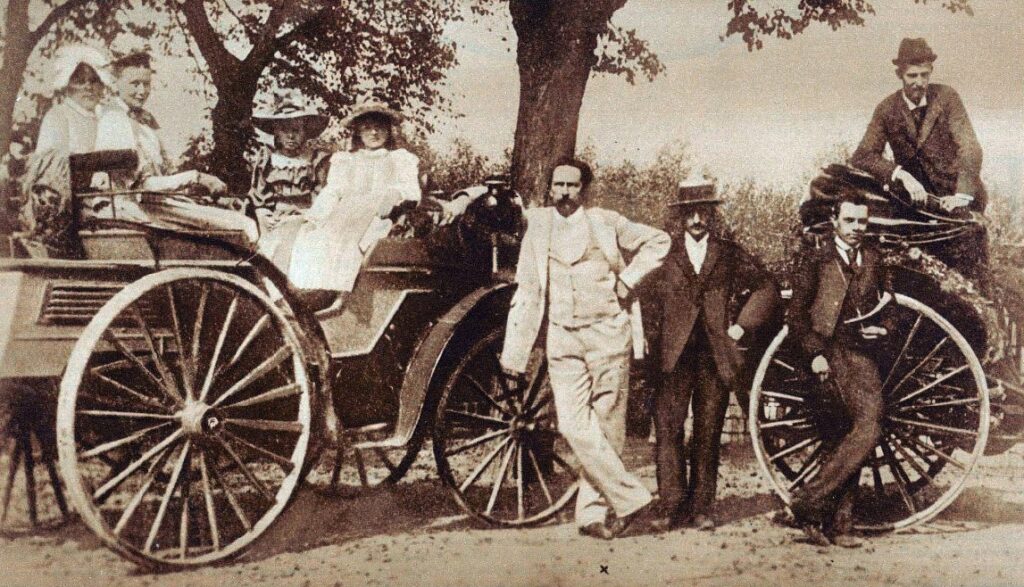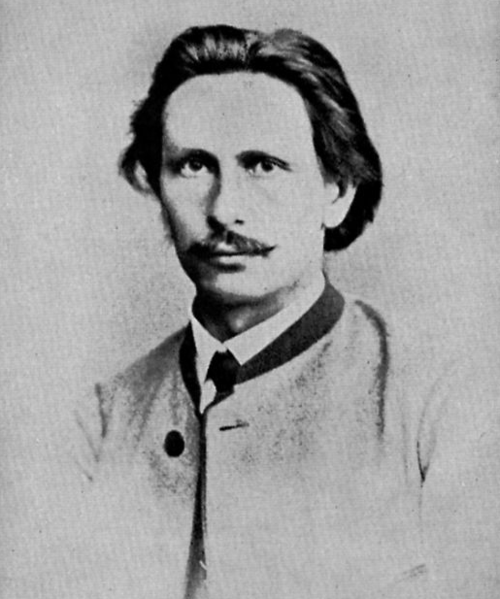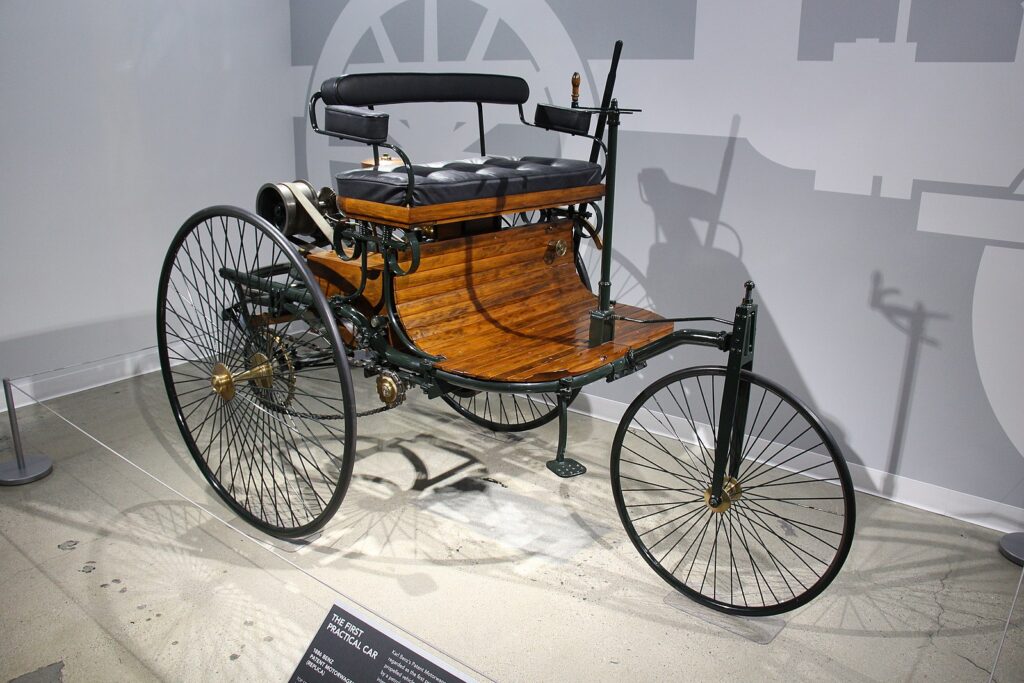Can you imagine a life without automobiles? It can be difficult to fathom that just 140 years ago, there were none of them on the road.
But who invented the car? The name should be quite familiar: Karl Benz.
It is important to note that while Benz is credited for its invention, many inventors and innovators before him helped create the foundation of an automobile.

Karl Benz
Karl (or Carl) Friedrich Benz was a German mechanical engineer who designed the first practical automobile with an internal combustion engine. He was granted a patent in 1886 and called it the Benz Patent-Motorwagen.
The vehicle didn’t look like the cars we have today—it was a two-seater vehicle with three wheels. However, it became the basis for the creation of all modern cars.
Early Life
Karl Benz was born in Germany on November 25, 1844. His mother, Josephine Valiant, raised him on her own. His father, Johann George Benz, was a locomotive driver who died of pneumonia when Karl was two years old.
Benz grew up poor but demonstrated a high level of intellect at an early age. He attended a science-oriented elementary school and entered the Karlsruhe Institute of Technology. There, he was mentored by Ferdinand Redtenbacher, who became the founder of scientific mechanical engineering.
The future inventor of the car initially had his eyes set on locksmithing. However, he decided to pursue studies that reminded him of his dad.
After graduating, Benz pursued various jobs that took him to different parts of Germany and eventually Vienna. He went back to Manheim to open his own business in 1871.

Founding of Benz & Cie
Benz’s first business pursuit failed. But in 1883, he opened a company called Benz & Company Rheinische Gasmotoren-Fabrik, or Benz & Cie, which produced industrial machinery. He found success in this endeavor, which gave him more resources to pursue his dream of designing a horseless carriage.
With his strong background in mechanical engineering, Benz created the first automobile using the principles of the bicycle, which he was always fond of. This brand-new machine had wired wheels instead of the wooden ones found in carriages.
The Benz Patent-Motorwagen was created in 1885 and received a patent on January 29, 1886, as an “automobile fueled by gas.”
The first model ran at a top speed of 16 kilometers per hour. To put this in perspective, the global average speed of modern cars is 30 kilometers per hour.

Bertha Benz Nee Ringer
As many would say, behind every successful man is a woman. This is very true in the case of Benz.
Remember when we mentioned that Benz’s first business failed? It was Bertha Ringer who bailed him out. She was born into a wealthy family and had a large dowry, which she used to purchase Benz’s company share.
The couple got married on July 20, 1872, and had five children. Benz and Ringer tried to fund their first venture together until they couldn’t anymore. Ringer continued to rally behind Benz when Benz & Cie launched.
The Benz Patent-Motorwagen may have received a patent but did not do well commercially. Ringer helped change this.
Without her husband’s knowledge, Ringer took their two sons and drove the vehicle 100 kilometers on mostly unpaved roads. It was the world’s first long-distance journey in an automobile, done in 1888. This demonstrated to the public that the vehicle was safe and convenient for families to travel in.
The Emergence of the Mercedes-Benz Group
In 1888, the Benz automobile was made available commercially. The car only had two gears. Ringer was Benz’s field tester and suggested that a third gear be added to make it easier to drive uphill.
By 1899, Benz & Cie was the largest automobile company in the world, producing around 572 units every year. In 1926, Benz & Cie merged with Daimler Motoren Gesellschaft, originally a German engineering company. They became Mercedes-Benz.
It has been more than 136 years since Benz sold his first car, and there are now 758 global car and automobile manufacturing businesses worldwide. The Mercedes-Benz Group is one of the biggest car companies, with a revenue of $156.23 billion.
Here are the current rankings in terms of revenue:
- Volkswagen
- Toyota
- Stellantis
- Mercedes-Benz
- Ford
The Journey Toward the Invention of the Car
Benz may have been credited as the inventor of the car, but he did not pluck the concept out of thin air. Many significant innovations in the previous decades and centuries helped Benz develop such a sophisticated machine.
In the 1500s, Leonardo da Vinci put the idea of a self-propelled car onto paper. The design is spring-driven, which means it has to be wound up to run.
Nicolas-Joseph Cugnot, a French military engineer, designed the first true automobile in 1769: a self-propelled vehicle with a steam engine. The primary purpose of the vehicle was to move heavy artillery pieces. Its top speed was 3.2 kilometers per hour, and it had to rebuild steam every 20 minutes.
In 1826, English engineer Samuel Brown developed one of the earliest concepts of an internal combustion engine. He was granted patents for machinery improvements and is sometimes referred to as the father of the gas engine. However, his invention didn’t gain traction at the time.
Belgian inventor Etienne Lenoir successfully launched the first commercially sold internal combustion engine. It was used in many applications, such as pumping and printing. This innovation is critical to the invention of the car.
There were many more inventions and innovations along the way, but Benz has always been credited for creating the first proper automobile.
“We generally think of the 1886 Benz Patent-Motorwagen as the first proper car,” author Tom Standage wrote in A Brief History of Motion: From the Wheel, to the Car, to What Comes Next. “Carl Benz built an entirely new vehicle around an internal combustion engine and used bicycle parts to do it. It was really a motorized bicycle, so this is what makes the car interesting.”
What If Karl Benz Didn’t Invent the Car?
Have you imagined a life without cars? If Karl Benz didn’t do it during his lifetime, somebody else would have invented the automobile, whether using the same mechanism or not. After all, inventions happen because creative and talented people are always looking for ways to solve current problems.
Today, tens of millions of cars are produced worldwide each year. China, Japan, and Germany are the leading manufacturers.

